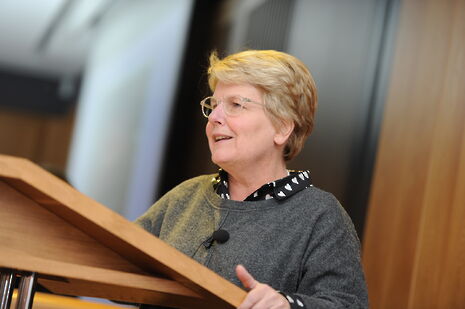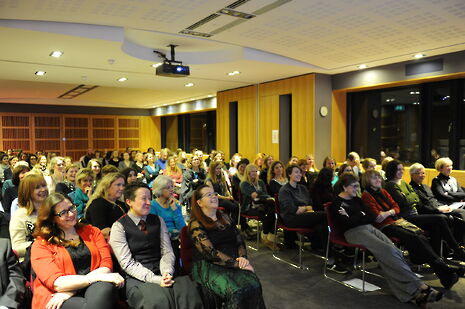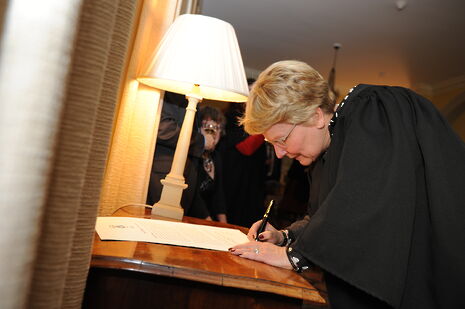Sandi Toksvig: ‘It’s unbelievable that in 2016 women are still making firsts’
Anna Menin and Clara van Wel talk women, nonpartisan politics, and manspreading with the writer and broadcaster

For a woman who stands at a modest 4’11’’, Sandi Toksvig towers. Her wit alone allows her at least another foot, and her enthusiasm is contagious. She is in Cambridge to deliver a talk entitled ‘Women, Revolution, and Knitting’ at Newnham College, where she was elected an honorary fellow in March.
“I’m fascinated by women’s history,” she tells us, ensconced in an armchair and sipping her tea. Years of television and radio have taught her how to own space better than anyone. “Women have been a huge and important part of history but on the whole have been underpaid, overlooked, and undervalued.”
Toksvig herself has been a victim of this — she recalls her time at Cambridge as being spent vying for the right to a voice. She wrote and performed in the first all-female Footlights show — or, as she takes care to remind us, “the only all female Footlights show.”
“We were tired of just not being allowed to be funny.”
“There was a woman called Emma Thompson – I’ve no idea what happened to her – she and I got fed up in the sketches of saying things like ‘The doctor will see you now,’ … so we decided to write our own show.”
“We were tired! We were tired of just not being allowed to be funny. We tried to make a very big statement and maybe another one needs to be made again.”
After graduating from Cambridge, where she read Anthropology, Archaeology and Law at Girton College, Toksvig maintained her passion for comedy and writing. She is best known as the host of BBC Radio 4’s The News Quiz, which she presented for nine years.
And she has remained a firm advocate of gender equality. In 2015, Toksvig left The News Quiz to co-found the Women’s Equality Party (WEP), which proudly proclaims itself to be “the only political party which hopes to one day not exist.”
WEP has drawn some criticism for its nonpartisan nature, and for the contradictions inherent to being a single-issue party with an extremely broad remit. Toksvig, however, refuses to see its lack of ideological politics as a detraction: “it doesn’t matter whether you come from the left or the right, we can all work together, we can always have a conversation and see how can we change things for the better.”
This conversation, she argues, is even more important post-Brexit.

“We need to make absolutely certain that the rights which have been hard fought for which have come to us through the European Union and benefit women are not removed, and nobody has a plan for how that’s going to happen.”
This comes in the wake of the first WEP Conference last weekend, which she describes as “one of the most heartening and thrilling things I’ve ever been to.” Toksvig is keen to emphasise that its attendees weren’t limited to those disillusioned with the mainstream political parties, but included “a lot of people who had never engaged in politics before. And that’s a really wonderful thing.”
She attributes this to the simplicity of WEP’s stance: “it’s not complicated: equality is better for everybody.”
“It’s not complicated: equality is better for everybody.”
Of course, getting this notion across to people is not quite so straightforward. “I’m saddened that a really great con job has been done over the years on the word ‘feminism’ – be one, be proud of being one. I can’t bear it when people say, “I’m not a feminist but,” because if there’s a ‘but’ in the sentence then something’s not going well. To be a feminist means to stand up for yourself and to fight for equality and I think it’s one of the things I’m proudest of being.”
This comes from a woman who has many other things to be proud of – she recently became the first female host of a mainstream television quiz show, for one, taking over from Stephen Fry on QI earlier this year. Why, though, has it taken this long?
“I don’t know, because really it’s not that difficult. They give you the questions beforehand, and the card you hold with the questions on is not as heavy as the boys led me to believe, so I don’t know what the reason is,” she quips.
“I think it’s unbelievable that in 2016 women are still making firsts, and that I’m still doing a first.”
She reflects that, “One of the reasons that I did well in my early years of broadcasting is that I have a deep voice. It helps: when you’re doing a comedy show with five people trying to be funny, your voice has to cut in.”
“Male voices on the whole, because they’re deeper and more forceful, will occupy the space a bit better, in the same way that men generally occupy space,” at which point she deftly demonstrates ‘manspreading’ in her armchair, legs outstretched.
For Toksvig, the key is for women to force themselves to speak up, even in the most challenging of environments. “Hear your voice in the space. We have to keep making ourselves do it.”
“Do anything to challenge yourselves,” she continues earnestly, “to be part of the public space, because it is a real issue.” She recounts how, in the 2015 election, more men were elected to be MPs than the total number of women who have ever been MPs throughout history. “It won’t do,” she cries.

“We have to stand for things, we have to want to be elected for things, we have to put ourselves forward to lead things, to be in charge, and some days it’s scary, and some days you don’t want to do it. But I don’t know any other way, other than we need to take the space back. Fifty-one per cent of the population, let’s take 51 per cent of the space, okay?”
“Nothing about women for 2000 years – what were we doing, laughing whilst eating salad?”
After our interview, Toksvig begins her talk by explaining that if you look at the Wikipedia page for November 25th, it features just three events involving women. She laments that this is the case for most days in history, where there is often “nothing about women for 2,000 years – what were we doing, laughing whilst eating salad?”
She uses images of women knitting in the background during significant historical events to trace their often unrecorded contributions to them.
“In the midst of adversity, women managed to be both productive and creative.”
Toksvig considers women to be “the greatest race of underdogs in history,” and spends the next hour discussing the ways in which they have been sidelined even in movements for which they have fought the hardest. She descries the recording of history as “a vast monument to men.” To her, the pattern of revolution and regression seems unchanged, but she has not been disheartened; one need only look at her ceaseless work in the field of gender equality to see that.
What, then, an audience member asks, does Toksvig think of our new Prime Minister, Theresa May?
“She has not done anything so far for women,” she replies immediately, with clear frustration. Although she then qualifies this by admitting that she knows May “a bit”, and thinks she is “extremely nice”, the disappointment remains evident.
“She’s cleaning up a mess that the boys left behind, running away as fast as the stab wounds in their backs would allow,” she concludes. She clearly sees this as a running theme throughout history, and strongly urges the audience to “have all the facts at your fingertips, because they will make you angry.”
“And if you knit at the same time,” she adds, “that’s wonderful”
 Features / Beyond the porters’ lodge: is life better outside college?24 February 2026
Features / Beyond the porters’ lodge: is life better outside college?24 February 2026 News / Cambridge academics sign open letter criticising research funding changes22 February 2026
News / Cambridge academics sign open letter criticising research funding changes22 February 2026 Theatre / Footlights Spring Revue? Don’t Mind if I Do!25 February 2026
Theatre / Footlights Spring Revue? Don’t Mind if I Do!25 February 2026 Fashion / The evolution of the academic gown24 February 2026
Fashion / The evolution of the academic gown24 February 2026 News / Student and union protesters hold ‘Trans Liberation Solidarity Rally’ 24 February 2026
News / Student and union protesters hold ‘Trans Liberation Solidarity Rally’ 24 February 2026









![How to Create an Attractive Freelancer Portfolio [5 Tips & Examples]](https://www.varsity.co.uk/images/dyn/ecms/320/180/2026/02/vitaly-gariev-ho2tNOWZYXM-unsplash-scaled.jpg)
